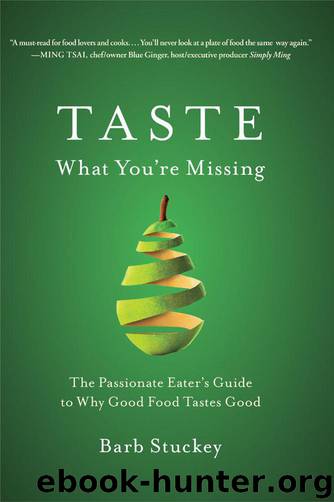Taste: Surprising Stories and Science About Why Food Tastes Good by Barb Stuckey

Author:Barb Stuckey [Stuckey, Barb]
Language: eng
Format: epub
Publisher: Atria Books
Published: 2012-03-12T20:00:00+00:00
Bitter Bits
Many things in food taste bitter. Unlike the sour taste, which comes only from acids, bitter compounds include amino acids, peptides, esters, lactone, phenols, polyphenols, flavonoids, terpenes, methylxanthines (caffeine), sulfimides (saccharin), and salts. This is why we need so many different receptors. We need to recognize all bitter substances in order to avoid them at harmful levels.
Coffee is one of the most widely consumed bitter foods in the world, and most people think it’s the caffeine that gives coffee its characteristic bitter taste. In fact, only about 10 percent of the bitterness in coffee comes from caffeine. The rest comes from phenolic acids that result from the roasting process as well as the temperature, time, and method you use to brew the coffee. This makes sense, as decaffeinated coffee can be just as bitter as caffeinated. The bitterness in tea and chocolate also comes mainly from phenolic compounds other than caffeine.
Your genes influence whether or not a food tastes bitter to you. Remember the chemical PROP, used to test for sensitive taster types? Twenty-five to 30 percent of the population cannot taste it at all. The vast majority of people find it slightly bitter. A quarter to a third of the population finds it unbearable. There are probably receptor genes for other bitter tastes (caffeine, quinine, and so on) that make people experience them differently. Individuals differ widely in our ability to detect bitter tastes, much more so than for the other Basic Tastes.
It’s possible that ancient tribes who lived in parts of the world where there was no threat from ingesting a certain type of bitter taste (tea leaves or broccoli, for example) might have lost the specific bitter receptor for it because it never got activated. One recent study asked adults to identify the predominant tastes they experienced in their diet for a period of a week. Not surprisingly, only 5 to 8 percent of the calories they ate were rated as bitter. This may mean that those of us who live in highly developed nations—where we eat very little in the way of bitter foods—might start to lose more of our bitter receptors. It won’t happen in the short run, but it could happen over centuries of cushy living and bitter-free eating.
Download
This site does not store any files on its server. We only index and link to content provided by other sites. Please contact the content providers to delete copyright contents if any and email us, we'll remove relevant links or contents immediately.
A Court of Wings and Ruin by Sarah J. Maas(7845)
The Death of the Heart by Elizabeth Bowen(3621)
Better Homes and Gardens New Cookbook by Better Homes & Gardens(3595)
The Sprouting Book by Ann Wigmore(3592)
BraveTart by Stella Parks(3449)
Salt, Fat, Acid, Heat: Mastering the Elements of Good Cooking by Nosrat Samin(3147)
Sauces by James Peterson(3099)
Kitchen confidential by Anthony Bourdain(3090)
The Bread Bible by Rose Levy Beranbaum(3069)
Classic by Mary Berry(3013)
Solo Food by Janneke Vreugdenhil(2976)
Ottolenghi - The Cookbook by Yotam Ottolenghi(2946)
Martha Stewart's Baking Handbook by Martha Stewart(2860)
Day by Elie Wiesel(2783)
Betty Crocker's Good and Easy Cook Book by Betty Crocker(2724)
My Pantry by Alice Waters(2621)
The Plant Paradox by Dr. Steven R. Gundry M.D(2620)
The Kitchen Counter Cooking School by Kathleen Flinn(2520)
Hot Sauce Nation by Denver Nicks(2495)
